Zimbabwe’s Prime Minister
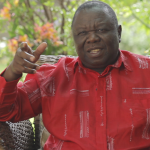
Morgan Tsvangirai
Morgan Tsvangirai is the second Prime Minister of Zimbabwe since Independence. On February 11, 2009, Tsvangirai became Robert Mugabe was Zimbabwe’s first Prime Minister, a position abolished in 1987 to make room for an executive presidency and unicameral parliament. Tsvangirai was inaugurated Prime Minister after protracted negotiations brokered by the Southern African Development Community (SADC) and facilitated by South African President Thabo Mbeki. Although Tsvangirai won the disputed first round of the March 29 Presidential election with 47.9% of the vote, he boycotted the mandated run-off after widespread violence against MDC supporters.
Urgent negotiations finally culminated in the Zimbabwean parliament unanimously passing Constitutional Amendment 19 creating a transitional government and power-sharing arrangement between Robert Mugabe as President and Morgan Tsvangirai as Prime Minister. The Global Political Agreement signed on September 15, 2008 stipulated that, as Prime Minister, Tsvangirai serve as Chairman of the Council of Ministers, and deputy chairman of Cabinet. Tsvangirai was sworn in at State House in Harare on February 11, 2009.
Prime Minister Tsvangirai continues to serve as the President of the majority party in parliament, the Movement for Democratic Change (MDC). Central to the vision of the MDC is (1) democratization, including a new people-driven constitution leading to free and fair elections and restoration of basic human rights and political and media freedoms, (2) humanitarian assistance to address the cholera crisis and chronic food shortages in particular, and (3) economic stabilization, ending corruption, abuse of state power and state institutions.
At independence in 1980 Morgan Tsvangirai, who was then aged 28, joined the then popular and victorious ZANU-PF party led by the man who was later to become his biggest political rival, Robert Mugabe. Tsvangirai is reported to have been an ardent Mugabe supporter and to have risen “swiftly in the hierarchy”, eventually becoming one of the party’s senior officials. He is also known for his role in the Zimbabwean trade union movement, where he held the position of branch chairman of the Associated Mine Workers’ Union and was later elected into the executive of the National Mine Workers’ Union. In 1989 he became the Secretary-General of the Zimbabwe Congress of Trade Unions, the umbrella trade union organization of Zimbabwe.
Tsvangirai led the ZCTU away from the ruling ZANU-PF. As his power and that of the movement grew, his relationship with the Government deteriorated. He has survived at least three assassination attempts, including one in 1997 where unknown assailants burst into his tenth story office and tried to throw him out of the window.
Contact:
@MRTsvangirai
Source: http://www.zimbabweprimeminister.org
Other Zimbabwe Activists
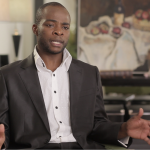
Joseph Mungwari
Joseph Mungwari is the head of the Private Office in the Office of the Prime Minister of Zimbabwe, Morgan Tsvangirai. The office provides strategic, gate-keeping functions for the prime minister on key decisions, including whom the prime minister sees and places he visits. Mungwari’s functions include day-to-day management and administration of the entirety of the prime minister’s private office. It also involves undertaking preparatory work for the prime minister’s official international visits.
Mungwari has a background in business management, international relations, and political communications, which he used in his previous roles before joining the inclusive government that was established in February 2009. Mungwari participated in the landmark March 2008 political elections that gave the main opposition a victory. Party to the political negotiations, Mungwari was instrumental in establishing the Office of the Prime Minister, specifically the Private Office.
Source: http://draperhills.stanford.edu/docs/dhsfp_class_of_2010
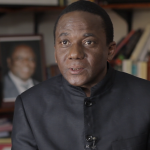
Jameson Timba
Jameson Timba is a member of the National Executive Committee of the Movement for Democratic Change (MDC) and the party’s Secretary for International Relations & Cooperation. The MDC is the largest party in the Lower House of Parliament and a coalition partner in the transitional inclusive government of Zimbabwe. He is the member of Parliament for the Mount Pleasant Constituency of Harare. In the coalition government of Zimbabwe, he is a Cabinet Minister and serves as Minister of State in the Prime Minister’s office since June 22, 2010. He is the Chief Political Advisor to the Prime Minister and his role is to assist the Prime Minister in discharging his constitutional mandate of overseeing the formulation of policy by cabinet and supervising its implementation by the entirety of government.
Prior to this appointment, Timba was the Deputy Minister of Media, Information and Publicity from February 14, 2009 to June 22, 2010, tasked with spearheading media reforms in Zimbabwe. Before his reassignment he had successfully pushed for the operationalization of an independent Media Commission and opening up of the print media environment which was dominated by the state leading to the registration of two independent daily newspapers to complement independent weekly newspapers.
Outside government and politics, Timba operates an ICT and mining business. Prior to establishing his own business in 1996, Timba had worked for government, civic society and the private sector for nine years. From 2004 to 2008, Timba was the Chairman of the Board of Trustees of Arundel School and, from 2005, he was the Chairman of the Association of Trust Schools (a grouping of all private schools in Zimbabwe). During this period he successfully defended the right of independent schools to exist and operate without state interference by mounting ten lawsuits against the then Minister of Education without a single loss. He has been engaged in politics since 1989 as a founding member of the Zimbabwe Unity Movement, a party which was led by the former Secretary General of Zanu-PF the late Edgar Tekere. The party, together with other non-state actors, was successful in stopping the then ruling united Zanu-PF from legislating for a one party state in Zimbabwe following the historic election of 1990. He joined the MDC in 2000 and, from 2006 -2008, served as Political Advisor to the MDC President Morgan Tsvangirai and as his campaign manager for the 2008 presidential election run-off. Timba holds a Bsc in Political Science and a Master of Business Administration (MBA).
Contact:
@JamesonTimba
Source: Jameson Timba
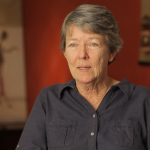
Judith Todd
Judith Todd, born in colonial Rhodesia, fought at great personal cost for the new state of Zimbabwe. She is daughter of Garfield Todd (1908–2002), Rhodesian Prime Minister 1953-8, and a political activist regarding Zimbabwe. She had been married from 1974 for ten years to Sir Richard Acton.
Todd was a political activist from the early 1960s, opposing the minority government of Ian Smith. She was arrested in 1972, together with her father. Protesting against her detention without charge or trial by the white Ian Smith regime, she went on a hunger strike, which was broken in prison by force-feeding. On her release she was exiled abroad for over seven years. She relocated to London.
In 1978, she was among the founding members of Zimbabwe Project Trust then dedicated to the welfare of former freedom fighters, now termed war veterans. Her exile lasted until all detentions were lifted in February 1980 under the process leading to the independence of Zimbabwe.
The trust relocated from London to Zimbabwe and Todd was appointed director, a position she held until 1987. The trust’s focus shifted to humanitarian aid, especially relocation and training of liberation war ex-combatants.
After an unsuccessful candidature for a seat in parliament for the Zimbabwe African People’s Union (ZAPU), she worked as a journalist. In 1999, Todd was a founding shareholder of The Daily News newspaper, which was subsequently banned in 2003. In 2002 she was one of hundreds of thousands of Zimbabweans stripped of their citizenship, and thus their right to vote, by the Robert Mugabe regime.
Over time, she became a strong critic the regime of Robert Mugabe. In 2007, Todd revealed in her memoir, “Through the Darkness: A life in Zimbabwe,” that when she criticized Mugabe’s North Korean trained 5th Brigade’s massacre of civilians in Matebeleland, she was detained and raped by a senior army officer. However, she sees him as a victim in the same way she was. “I have no reason to believe he wanted to do what he did, quite the opposite…It’s so complex because he was obviously so troubled and so unhappy. I just regard him as a fellow victim….maybe someone was watching him. That’s what has happened to so many people in Zimbabwe.”
Todd lives in Zimbabwe’s second city, Bulawayo, and is a member of the Board of SALO, the Southern African Liaison Office, which is dedicated to building international concensus.
Sources: Judith Todd, http://en.wikipedia.org/wiki/Judith_Todd and
http://www.telegraph.co.uk/news/worldnews/1556950/Robert-Mugabe-critic-raped.html
Zimbabwe Opposition Politician
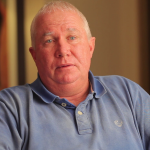
Roy Bennett
Roy Bennett is a Zimbabwean politician and former member of the British South Africa Police. He was also a member of the House of Assembly of Zimbabwe for the seat of Chimanimani, where he is affectionately known as Pachedu (loosely translated as “Between Us”). He is currently the Treasurer of the Movement for Democratic Change party led by Morgan Tsvangirai. He was one of the three white parliamentarians elected in the Zimbabwean parliamentary election, 2000 despite the intimidation against MDC voters by supporters of Zanu-PF. During the campaign, his wife who was 5 months pregnant, was physically abused and subsequently lost her baby boy.
During the MDC split over the proposed boycott of elections to the Zimbabwe Senate in 2005, Bennett sided with MDC President Morgan Tsvangirai in support of the boycott.
Roy Bennett previously lived in South Africa as a refugee. His application for asylum was initially rejected by the South African Department of Immigration. After a court ruling by the South African Human Rights Commission, his asylum request was accepted on May 13, 2007.
During his time in exile, he had an active role in activism for Zimbabwe and particularly the MDC in South Africa. In 2006, he became the treasurer general for the main stream faction of the MDC led by Morgan Tsvangirai. He was also a spokesmen in South Africa and made regular interviews on behalf of the MDC.
During Robert Mugabe’s 84th Birthday celebrations at the border area of Beitbridge before the 2008 election, Roy Bennett led a demonstration on the South African side of the border against the President:
“We are gathered here after many years of suffering, while across the river, after 28 years, a man who is now 84 years old, is having a birthday party. A birthday party while everybody around him is starving and dying. There’s no electricity, there are no roads, there are no jobs, there’s no education, there’s no medical, there’s no nothing. He is spending 300,000 US dollars to have a birthday party.”
At the end of January 2009, after several years in exile, he returned to Zimbabwe to join a debate within the MDC to decide whether or not to agree to the power-sharing government with Mugabe. After the MDC ultimately agreed to share power with ZANU-PF, Morgan Tsvangirai designated Bennett as Deputy Minister of Agriculture on February 10, 2009.
On February 13, Bennett was arrested again while trying to (legally) leave Zimbabwe on a private plane at Charles Prince Airport. He was brought to police stations in Goromonzi and Mutare on that day, and is said to have suffered an attempt to drown him on the way there. He was charged with treason, and the MDC reported that he had been denied food in jail.
Charges were later replaced with those of “conspiring to acquire arms with a view to disrupting essential services.” When a magistrate ordered Bennett released, the magistrate himself was arrested because “he has passed a judgment that is not popular with the state,” and was charged with criminal abuse of office. Bennett was released from remand prison on March 12, 2009, but was ordered back on October 14, 2009. On October 16, 2009, Judge Hungwe instructed the prison to release Roy Bennett on his old bail conditions.
On Monday May 10, 2010, Roy Bennett was acquitted. On the day of his acquittal, fresh charges were brought against him by CID Law and Order detectives for illegally storing grain. As there were no grounds for these accusations, he was instead charged of perjury and contempt of court. After warrants for his arrest were issued, Roy Bennett has been in exile in South Africa since September 2010.
Source: http://en.wikipedia.org/wiki/Roy_Bennett_%28politician%29
Zimbabwe’s President
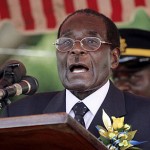
Robert Mugabe
Robert Mugabe (in archive footage) is the President of Zimbabwe. As one of the leaders of the liberation movement against white-minority rule, he was elected into power in 1980. He served as Prime Minister from 1980 to 1987, and as the first executive head of state since 1987.
Mugabe rose to prominence in the 1960s as the Secretary General of the Zimbabwe African National Union (ZANU) during the conflict against the white-minority rule government of Ian Smith. Mugabe was a political prisoner in Rhodesia for more than 10 years between 1964 and 1974. Upon release with Edgar Tekere, Mugabe left Rhodesia in 1975 to re-join the Zimbabwe Liberation Struggle (Rhodesian Bush War) from bases in Mozambique.
At the end of the war in 1979, Mugabe emerged as a hero in the minds of many Africans. He won the general elections of 1980, the second in which the majority of black Africans participated in large numbers (though the electoral system in Rhodesia had allowed black participation based on qualified franchise). Mugabe then became the first Prime Minister after calling for reconciliation between formerly warring parties, including white Rhodesians and rival political groups.
The years following Zimbabwe’s independence saw a split between the two key belligerents who had fought alongside each other during the 1970s against the government of Rhodesia. An armed conflict between Mugabe’s Government and dissident followers of Joshua Nkomo’s pro-Marxist ZAPU erupted. Following the deaths of thousands, neither warring faction able to defeat the other, the heads of the opposing movements reached a landmark agreement, whence was created a new ruling party, ZANU-PF, as a merger between the two former rivals.
In 1998, Mugabe’s government supported the Southern African Development Community’s intervention in the Second Congo War by sending Zimbabwean troops to assist the Kabila government. This was probably a tack to bolster the floundering Zimbabwean economy by plundering the DRC.
Since 2000, the Mugabe-led government embarked on a controversial fast-track land reform program intended to correct the inequitable land distribution created by colonial rule.[7] The period has been marked by the deterioration of the Zimbabwean economic situation. Mugabe’s policies have been condemned in some quarters at home and abroad, especially receiving harsh criticism from the British and American governments arguing they amount to an often violent land seizure. A wide range of sanctions have been imposed by the US government and European Union against the person of Mugabe, individuals, private companies, parastatals and the government of Zimbabwe. In 2008, his party suffered a tight defeat in national parliamentary elections, but after disputed presidential elections, Mugabe retained presidential power with the signing of a power-sharing deal with opposition leaders Morgan Tsvangirai and Arthur Mutambara of the MDC-T and MDC-M opposition party.
Source: http://en.wikipedia.org/wiki/Robert_Mugabe
Expert Commentators
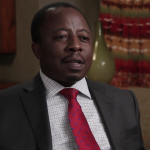
Sydney Masamvu
Sydney Masamvu is a senior political analyst for the Institute for Democracy in Africa (IDASA). He is a graduate of Harare Polytechnic’s Division of Mass Communication and started his career at the Financial Gazette, where he did his internship, rising to become the political editor. He was later to join The Daily News as an assistant editor, doing so after his former editor at the Financial Gazette, Francis Mdlongwa, joined the paper and took his team with him.
Masamvu won a U.S. journalism award in 2001 and, in 2003, won a Chevening Scholarship to study for a Masters degree in International Journalism at Cardiff University in Wales. Shortly after, he got a job as an analyst for the International Crisis Group based in South Africa even before submitting his dissertation, working with them until they closed their office in South Africa in September 2006.
In 2011, a 2007 diplomatic cable released by WikiLeaks give the appearance that Masamvu used his position as an analyst for International Crisis Group to gain access to senior South African government officials – then sold details of their discussions to American diplomats. Masamvu was evidently taken into the confidence of South African officials in intelligence and foreign affairs as they sought to formulate their policies on Zimbabwe. However, unbeknownst to them, Masamvu was all the time working with the American embassies in Harare and Pretoria, channeling details of their discussions.
The cable indicates that Masamvu joined Institute for Democracy in South Africa’s Countries in Transition office on November 1, 2006. His salary was co-funded by USAID Zimbabwe and USAID South Africa, but the cable said the source of Masamvu’s salary should be strictly protected. His main task was to analyze developments in Zimbabwe and Swaziland and engage with journalists. The U.S. Embassy said it had worked with Masamvu for two years and had been consistently impressed by his insights and analysis.
Sources: http://www.newzimbabwe.com/news-6025-WikiLeaks%20outs%20US,%20SA%20double%20agent/news.aspx and
http://www.insiderzim.com/stories/2300.html
Others
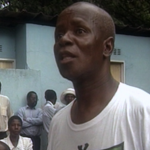
Chenjerai “Hitler” Hunzvi
Chenjerai “Hitler” Hunzvi (in archive footage) served as Chairman of the Zimbabwe National Liberation War Veterans Association beginning in 1997. Hunzvi said that he joined the struggle against white minority rule in Rhodesia at the age of 16 taking the nom-de-guerre of “Hitler.” He reported to have been interned in Gonakudzingwa and Wha Wha prisons between 1967 and 1970, and to have been a prominent leader in Zimbabwe African Popular Union (ZAPU) and Zimbabwe People’s Revolutionary Army (Zipra), though these claims have been denied by other respected elders of the campaigns. He left the country and having been identified as being bright, was sent to study in Romania, becoming fluent in Romanian and French, and subsequently began medical studies in Poland, where he married a Polish woman named Wiesława Hunzvi, with whom he had two children. He represented ZAPU while in Poland, and in 1979, he attended the Lancaster House talks in London, where a ceasefire and constitution for Zimbabwe were negotiated. He then returned to Poland to continue his studies, and eventually qualified as a doctor. Two other marriages brought him four children.
Hunzvi returned to Zimbabwe in 1990, working initially at Harare Central Hospital, and later founding a medical practice in Budiriro, in the township of Harare. Wiesława Hunzvi fled Zimbabwe in 1992 to escape violence from her husband. She described Hunzvi as a “cruel and vile man who took delight in beating me. And as for the war, he never fired a shot. He saw no action at all.” He subsequently remarried and has two other children.
Hunzvi was subsequently elected chairman of the Zimbabwean Liberation War Veterans Association in 1997, which, at the time, a relatively inactive organization. A born orator, Hunzvi organised rowdy demonstrations demanding gratuities and pensions from President Robert Mugabe, and critiqued the president. The pressure tactics were successful and the 50,000 war veterans were granted one-off payments of US $2,500, as well as monthly pensions of US $100. A compensation fund was also set up to benefit those who were disabled following war service, with the amount paid determined by the degree of disability. The fund was the subject of enormous fraud, with government officials, party officials and others (including Hunzvi) determined to be 117% disabled. Experts have claimed that the settlements were a major factor in the economic crisis in the Zimbabwe.
In 1999, Hunzvi was arrested in corruption case regarding the allegedly embezzlement of Z$45m of the war veterans’ funds. He was denied bail, due to fear that he would intimidate witnesses or abscond. The actual trial was repeatedly postponed, and the war veterans’ leadership voted to remove him from office.
In 2000 Hunzvi led the campaign involving war veterans and other supporters of ZANU-PF in the seizure of white-owned land. During parliamentary elections in 2000, he incited followers to intimidate and harass members of the opposition group, the Movement for Democratic Change. Calling himself “the biggest terrorist in Zimbabwe” he was identified by numerous witnesses as participation in beatings and torture, and his medical clinic labelled a “torture chamber” by Amnesty International in 2000. Numerous witnesses identified Hunzvi as a member of the gangs who severely beat and tortured them. According to numerous reports, which have never been denied, scores of people were tortured in his Budiriro medical offices. Although Hunzvi was known for his diatribes against whites, the vast majority of his victims were black.
Hunzvi was elected to parliament in 2000, but died in 2001 in Harare’s Parirenyatwa Hospital. His death was variably ascribed to malaria, a heart condition, or AIDS.
Sources: http://www.guardian.co.uk/news/2001/jun/05/guardianobituaries.zimbabwe
http://www.en.wikipedia.org/wiki/Chenjerai_Hunzvi
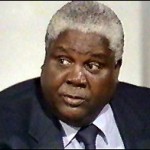
Joshua Nkomo
Joshua Nkomo (in archive footage) was the first modern nationalist leader in white-ruled Rhodesia. He was a giant, both politically and physically, who dominated the Zimbabwean stage for half a century. Known affectionately as Umdala Wethu – our old man – his life was marked by the struggle for independence and the introduction of majority rule. But it was a career defined first by friendship, and then by rivalry, with Zimbabwe’s first and only black president so far, Robert Mugabe.
Born to black missionary teachers in Matabeleland in 1918, Nkomo saved up for his education in South Africa, where he met Nelson Mandela and other regional nationalist leaders. He returned to Bulawayo in 1948 and became a trade unionist campaigning for better pay and conditions for black railway workers. The leader of a number of organizations during the 1950s and 1960s – which were all banned by the British colonial authorities – Joshua Nkomo founded the movement, which became most associated with his name, Zapu, in 1962. But the Zimbabwe African Peoples Union was also banned immediately.
Mr Nkomo came from Zimbabwe’s Ndebele minority, and a year after Zapu’s foundation there was a split with the nation’s Shona majority under the leadership of Nkomo’s former lieutenant, Robert Mugabe. Between 1964 and 1974, both rivals were detained for long periods by the Rhodesian government of Ian Smith, who declared independence unilaterally from Britain in 1965.
On his release, Mr Nkomo went to Zambia, from where he fought for Zimbabwean independence at the head of Zapu and its Zimbabwe People’s Revolutionary Army, which was backed by the Soviet Union.
The rivalry between the Zapu and Zanu leaders continued throughout the war, with Mr Mugabe receiving help from Beijing. The struggle for majority rule ended with the Lancaster House accord, paving the way for elections in 1980.
It was then that Joshua Nkomo’s cherished ambition of becoming Zimbabwe’s first black president was dashed. His party trailed Mugabe’s by 57-20 seats in the new 100-seat parliament. Nkomo made no secret of his bitterness at the defeat. He joined the first Mugabe coalition in the powerful Home Affairs ministry, but there was no harmony.
In 1982 Zapu was accused of plotting a coup and Nkomo was fired, his passport taken away, and he was restricted to Bulawayo. Mistrust between the two sides escalated, leading to a near civil war in the first half of the 1980s. Thousands of civilians in Matabeleland were killed by government forces, including a North Korean-trained Fifth Brigade.
It was not until 1987 that the differences were patched up, with Nkomo becoming one of two vice-presidents. Zimbabwe became a one-party state, with Mr Mugabe’s organisation effectively swallowing up the much smaller Zapu. As vice-president, Mr Nkomo’s career followed a steady decline.
Many in Matabeleland saw him as having sold out, and his failing health began to have an influence. But he kept up his attacks on whites for not becoming assimilated as “true Zimbabweans,” while his conservative attitudes were ill-suited to discourse with women seeking equality in a traditional African society. Nkomo died July 1, 1999.
Sources: http://en.wikipedia.org/wiki/Joshua_Nkomo and http://news.bbc.co.uk/2/hi/africa/382848.stm
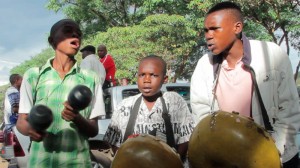
One thought on “Zimbabwe”
Comments are closed.